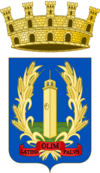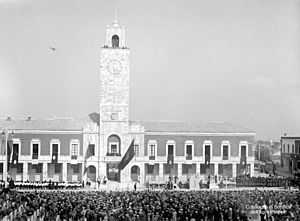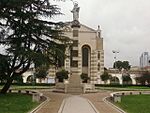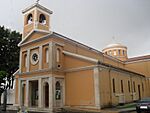Latina, Lazio facts for kids
Quick facts for kids
Latina
|
|||
|---|---|---|---|
| Comune di Latina | |||
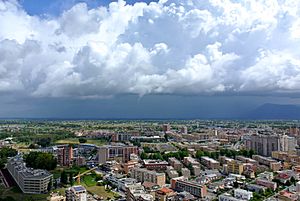
Panorama of Latina
|
|||
|
|||
| Country | Italy | ||
| Region | Lazio | ||
| Province | Latina (LT) | ||
| Frazioni | See list | ||
| Area | |||
| • Total | 277 km2 (107 sq mi) | ||
| Elevation | 21 m (69 ft) | ||
| Population
(31 December 2015)
|
|||
| • Total | 125,985 | ||
| • Density | 454.8/km2 (1,178.0/sq mi) | ||
| Demonym(s) | Latinensi | ||
| Time zone | UTC+1 (CET) | ||
| • Summer (DST) | UTC+2 (CEST) | ||
| Postal code |
04100, 04010, 04013
|
||
| Dialing code | 0773 | ||
| Patron saint | Saint Maria Goretti and St. Mark | ||
| Saint day | April 25, July 6 | ||
Latina (Italian: [laˈtiːna]) is a city in Central Italy. It is the capital of the province of Latina in the Lazio region. As of 2024, about 127,486 people live there. This makes Latina the second-largest city in the Lazio region, after Rome, the capital of Italy.
Latina is one of the newest cities in Italy. It was founded in 1932. At that time, it was called Littoria. The area where the city now stands used to be a large swamp. It was drained and made ready for building during a specific period of Italian history.
| Top - 0-9 A B C D E F G H I J K L M N O P Q R S T U V W X Y Z |
History of Latina: From Swamp to City
Even though people called Latins lived in this area long ago, the modern city of Latina was built much later. It was founded on June 30, 1932, by Benito Mussolini. He named it Littoria, which came from the word "fascio littorio," a symbol used by the government at that time. The city officially opened on December 18, 1932.
People from other parts of Italy, mainly from Friuli and Veneto, moved to Littoria. They formed a special community. The buildings and monuments in the city were designed in a style called "rationalist." Famous architects and artists like Marcello Piacentini helped create them.
In 1934, Littoria became the capital of its province. After World War II, in 1946, its name was changed to Latina. More people from the Lazio region moved to the city. Because of this, the original dialect spoken by the first settlers slowly changed to a form of the Romanesco dialect.
The city's official symbol, its coat of arms, is a blue shield. It shows a drawing of the City Hall Clock Tower on a green field. On each side of the tower, there are two stalks of wheat. A red ribbon ties them together at the bottom. On this ribbon, it says LATINA OLIM PALUS, which means "Latina, once a swamp" in Latin. A special crown sits on top of the shield.
What Latina Does: Economy
Latina has important industries. It produces medicines and chemicals. The city also has a strong service sector, which means many jobs are in areas like healthcare, education, and business services. Latina is also a key center for farming. Farmers grow vegetables, flowers, sugar, and fruit. They also produce cheese and other dairy products.
There used to be a nuclear power plant in Latina. It is now closed and is being taken apart safely.
Neighborhoods of Latina: Frazioni
The term "frazioni" refers to smaller towns or areas that are part of the larger municipality of Latina. These include: Latina Lido, Latina Scalo, Borgo Bainsizza, Borgo Carso, Borgo Faiti, Borgo Grappa, Borgo Isonzo, Borgo Montello, Borgo Piave, Borgo Podgora, Borgo Sabotino, Borgo Santa Maria, Borgo San Michele, Chiesuola, and Tor Tre Ponti.
Where Latina Is: Geography
Latina is located in the southern part of the Lazio region. It is about 62 kilometers (38 miles) south of Rome. The city shares its borders with several other towns. These include Aprilia, Cisterna di Latina, Nettuno, Pontinia, Sabaudia, Sermoneta, and Sezze.
Latina's Weather: Climate
Latina has a Mediterranean climate. This means it has hot, dry summers and mild, wet winters. This type of weather is common in many parts of southern Italy.
| Climate data for Latina | |||||||||||||
|---|---|---|---|---|---|---|---|---|---|---|---|---|---|
| Month | Jan | Feb | Mar | Apr | May | Jun | Jul | Aug | Sep | Oct | Nov | Dec | Year |
| Mean daily maximum °C (°F) | 14.2 (57.6) |
15.1 (59.2) |
18.1 (64.6) |
22.0 (71.6) |
24.9 (76.8) |
29.7 (85.5) |
32.1 (89.8) |
31.6 (88.9) |
28.8 (83.8) |
24.3 (75.7) |
18.7 (65.7) |
15.3 (59.5) |
22.9 (73.2) |
| Mean daily minimum °C (°F) | 4.1 (39.4) |
4.6 (40.3) |
7.3 (45.1) |
11.2 (52.2) |
14.3 (57.7) |
18.2 (64.8) |
20.7 (69.3) |
21.5 (70.7) |
18.1 (64.6) |
12.9 (55.2) |
8.6 (47.5) |
5.0 (41.0) |
12.2 (54.0) |
| Average precipitation mm (inches) | 81.3 (3.20) |
68.6 (2.70) |
73.7 (2.90) |
66.0 (2.60) |
38.5 (1.52) |
9.3 (0.37) |
2.8 (0.11) |
6.4 (0.25) |
35.7 (1.41) |
93.8 (3.69) |
111.5 (4.39) |
99.1 (3.90) |
686.7 (27.04) |
| Mean monthly sunshine hours | 165.9 | 179.5 | 213.1 | 230.1 | 278.5 | 325.8 | 367.6 | 343.2 | 280.9 | 225.6 | 161.3 | 154.9 | 2,926.4 |
| Source: Weatherbase | |||||||||||||
Famous People from Latina
Many talented people come from Latina, including:
- Manuela Arcuri, an actress
- Calcutta, a musician and composer whose real name is Edoardo d'Erme
- Fabrizio del Monte, a racing car driver
- Tiziano Ferro, a popular singer
- Antonio Pennacchi, a writer
- Mattia Perin, a football goalkeeper
- Karin Proia, an actress
- Ilaria Spada, an actress
- Elena Santarelli, an actress, model, and TV presenter
Latina's Global Connections: Twin Cities
Latina has "twin city" relationships with other cities around the world. These partnerships help promote cultural exchange and friendship.
 Palos de la Frontera, Huelva, Andalusia, Spain
Palos de la Frontera, Huelva, Andalusia, Spain Farroupilha, Rio Grande do Sul, Brazil
Farroupilha, Rio Grande do Sul, Brazil Birkenhead, Wirral, Merseyside, England
Birkenhead, Wirral, Merseyside, England
Images for kids
See also
 In Spanish: Latina (Italia) para niños
In Spanish: Latina (Italia) para niños
 | Bayard Rustin |
 | Jeannette Carter |
 | Jeremiah A. Brown |



